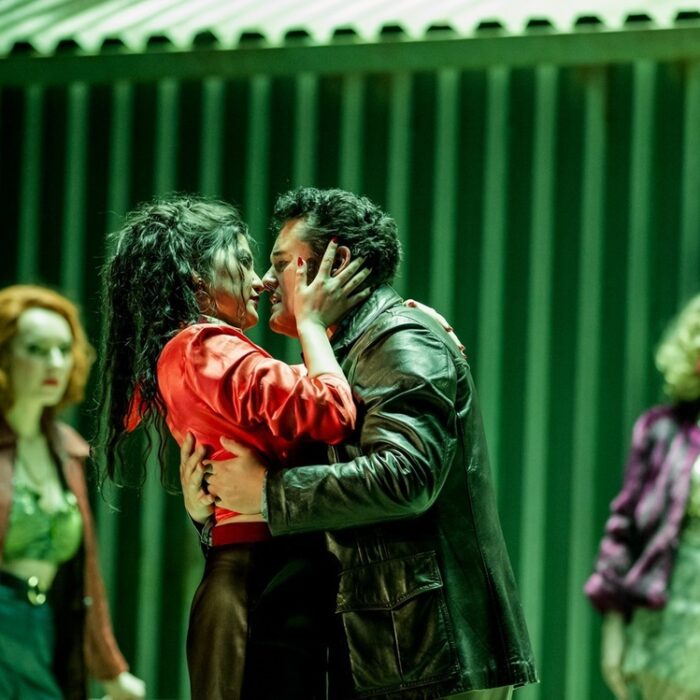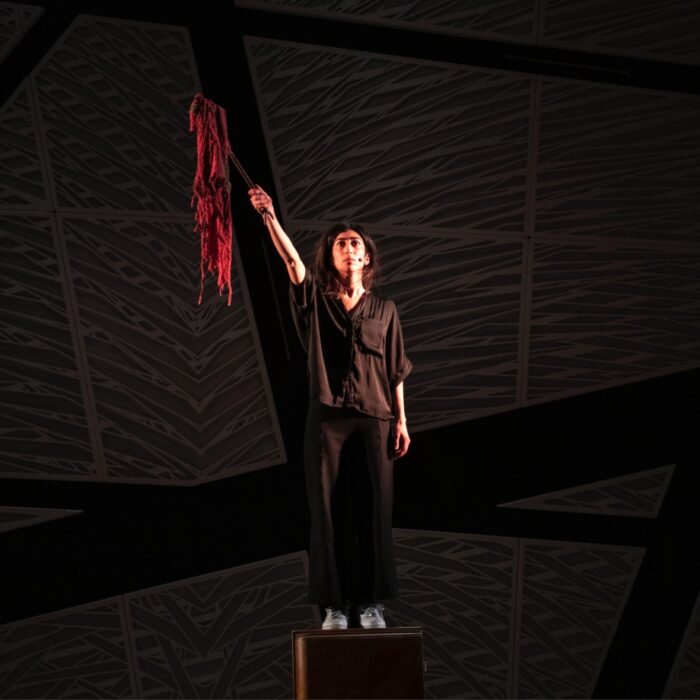
San Francisco Opera Virtual Review 2021: Das Rheingold: ‘Die Walküre’
Jamie Barton, Irene Theorin, Karita Mattila Lead a Passionate Performance of Wagner’s Masterwork
By Lois Silverstein(Credit: Cory Weaver)
From underwater to the wild and terrible world – Rhine Maidens to brother/sister love, father/daughter separation, gain to loss: in other words, “Die Walküre.”
And what a “Walküre” it was! Spectacular projections – swirling winds, walloping storm waters, trees bending and swaying every which way, and Siegmund waking to love for Sieglinde, in a house in the woods. Sieglinde receiving him despite her marriage to Hunding the fierce. Complete with the Americana of the American west – deer heads on the wall, alongside rifles and swords, multiple shelves of gold trophies, beer, and rough-handling of feelings that are far more tender and dear. This was hard-core opera, with music to die for.
Wagner ascended.
The score we know is gorgeous. The tapestry of motifs only set the stage for the remarkable pan-drama about to unfold. Conductor Donald Runnicles kept the high rhythmic energy throughout its nearly four-hour unfolding. The opening of Act two with the brass and strings leading the way more than set the tone for the steely office and skyscrapers out its window and the shifting dialogue between Wotan and Fricka. Their shifty temperaments were exquisitely coordinated with the winds, horns, and bassoons. Their voices were never lost either as they sang against the ascending and descending arpeggios leading and complementing their querulous discussion.
By the time of Brünnhilde’s defiant exposition to Wotan, and Wotan’s subsequent curse, the music served as a friend that could lament and lambast when appropriate. Of course, Sieglinde’s glorious melodic affirmation to birth the child of her union with Siegmund yielded a transcendent moment, no longer simply human, but perhaps, divine. The Valkyries too, added another dimension, giving us memorable entrees into choral singing, one of the few times when there is more than a solo piece.
Passionate Siblings
The characters shone. Siegmund, played by American tenor Brandon Jovanovich, was heroic, expressive, personal, and was able to approach Sieglinde with utmost love in a voice of caressing tones from the outset. While she took the lead in terms of ardor, Jovanovich easily moved toward her as he admitted he had seen her in his dreams of love. The recognition here showed Jovanovich filled with love at that very moment not merely transmitting the information. His own pleasure at “finding” her living and breathing before him was one of the several recognitions in the scene between them and was a perfect prelude to those recognitions that follow.
The progression intensified as the brother and sister’s feelings grew. Jovanovich’s performance of the luminous “Winterstürme wichen dem Wonnemond” was lovely. He conveyed the exquisite music, distinct from the dramatic monologues and dialogues so far, with lyrical warmth. The harp, clarinet, and bassoon amplified its gentle and happy prospects as their love brings forth Spring. Jovanovich captured so much of the beauty and the warmth of the poetry, as the set changed from dark and wintry to a pastel loveliness, with birds in song, although at some moments, words and notes lacked fullness. He remained a convincing and moving hero, however, replete with love and devotion as well as power and heroic conviction.
Sieglinde was sung by Finnish soprano Karita Mattila. She was outstanding in her dramatic and realistic portrayal, showing a terrific range of emotions. She was a naïve observer at the opening, when she saw Siegmund for the first time, a clever helpmeet as she plotted with him to fool Hunding, an ardent lover as she felt passion for him and even zeal to break her vows because of it. She poured herself into the part. She danced before him in an ecstatic display, she moved with girlish ease and became the bride with openness and ardor. She sang with rapture.
Her shame after their union – probably not because of the fact Siegmund is her twin brother, that recognition has not come about yet – but because she betrayed her marital vow – she carried off with authentic resonance. This was a truly suffering woman. So too, in her terror of Hunding as they run away, and in her grief when Siegmund dies. Also, in her final scene the exquisite exaltation affirming to Brünnhilde that she would bear and protect the child, her voice filled every drop of the sky. Here, Matilla’s voice thrilled and resounded with what felt like sacred truth. The twin lovers were well-matched, vibrant, passionate, ardent, their voices soaring.
Fiery Gods
Brünnhilde, Swedish soprano Iréne Theorin, was ardent and fiery. She managed swift changes of emotions with ease, or should we say, scorched into the situation. Furthermore, she dug out depths behind each emotion – devotional love for Siegmund, pity for his sorrow, compassion and sincere care for Sieglinde, passionate defiance of her father. She also evinced consolation for Sieglinde, caught in the wrath and the anguish of her father. With her eight sister Valkyries, she showed friendship and leadership. While she openly admitted her defiance of Wotan, she sincerely showed her wish to save them from a similar punishment. Then, of course, she sang a remarkable farewell to her father, complete with nuanced apologia, refusal to deny the truth, and belief in her actions while her admission brought devastating consequences. Her sadness at these was convincing, as was her acceptance. She was her father’s daughter in the end.
Theorin’s voice soared and dipped and carried these feelings far. Full and round, aching and caressing, it projected boldness and invincibility, as it conveyed intimacy and poignancy. Theorin’s performance gradually showed us how she becomes the “hero” of the opera. In her final scene with Wotan, she shows her courage, her power, and her capacity for surrender. Nimble on stage, Theorin’s Brünnhilde moved with grace from level to level, and person to person, but never taking her eyes off the imperative of the unfolding plot. Hard to believe so much depended and was portrayed in so moving a body, singing the glorious story of loss at the same time.
Greer Grimsley’s performance of Wotan was triumphant. In voice always declamatory and insistent, tonally resonant, determined, imperious, he succeeded in holding the role with confidence and bravado, throughout. He remained silent at appropriate times, and these moments aptly contrasted with his godlike galloping up and across the stage at key moments. His farewell to his beloved daughter he aptly rendered as did the curse he issued before. When he covered the warrior on the rock with his coat, when he lifted her head to soften the hard surface beneath, when he bid her his final farewell, we felt sincere regret and became enthralled with his commitment to the integrity of his belief. With Fricka, Grimsley showed conflict and submission, the “henpecked” husband, the struggling paternalistic male, who began finally to recognize he could not have everything he wanted.
Grimsley took the stage with conviction. The role demands the stamina not everyone who can sing as well as Grimsley can sustain. From the Rhine to the rocks, from a mountain to an office building, he never veered from his task. While we may question his hubris – with Brünnhilde and her sisters – his greed with Alberich in Rheingold, his iron will with Siegmund – we followed him as he rode the current of the consequences of his actions. Here was definitely a Wotan to reckon with.
Jamie Barton’s Fricka was one to behold. Not only was her voice glorious, dazzling in its highs and lows, but her acting skill also heightened her presentation. She stalked on stage, in her wine-red pant-dress, complete with fur cuffs, an apt contrast to the Board room she entered. There, she cajoled, she menaced, she demanded. We were under her vocal spell as Wotan was her imperious insistence on marriage vows. She was the Guardian of Marriage after all. She disapproved of what the twins have done to Hunding, let alone that they were brother and sister. She grew wild with fury and yet was cool and collected as she insisted Wotan sign her contract. Clearly, Fricka showed Wotan she was not one to mess with.
Hunding was sung by Raymond Aceto. Aceto aptly personified a mean-spirited, macho-tough guy of the Wild West, stomping around in his boots, a house stuffed with trophies and weapons, and a group of hooligans to help him out, if he should need them While we know Hunding is a straw man, his performance conveyed rough-tough oppressive behavior with remarkable and terrible conviction. He roared and stomped with vocal aptness, the harsh sounds he uttered were never hard to hear if hard to endure their content.
The eight Valkyries took the stage in parachute-style outfits and swung in with apparent ease. What an entrance! What buoyancy! What aplomb! And there was no question of lack of sisterhood, which in this case, was more than powerful. Their resilient singing coupled with Brünnhilde and then with Wotan’s with ease and beauty. It was a polished and even charming performance.
Last but not least were the remarkable pyrotechnics of the production itself. We had aerial entries by the Valkyries; fire round the rocky mountain where Brünnhilde sleeps; wild forest storm with trees bending and swaying, winds blowing; a magic word pulled free from an ancient ash tree, complete with “sturm und drang.” All this even without the music, the voices, the story.
Zambello’s “Walküre” illustrated what the narrative decries: the death of nature through technology. Yet, it showed technology as an apt handmaiden to art, created by humans. It contributed the spectacular element to the performance, no doubt, and those of us raised on cinema, did not blink twice at it. Other directors might disagree, including grandson Wieland Wagner. The success of the Zambello’s production did not hinge on these technical elements, however. Rather it enhanced what she emphasized throughout- human relationship, a moral challenge, and the power of art.


